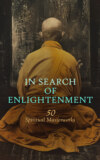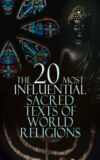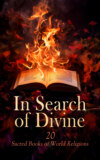Buch lesen: «Nightmare Tales», Seite 7
THE ENSOULED VIOLIN
I
In the year 1828, an old German, a music teacher, came to Paris with his pupil and settled unostentatiously in one of the quiet faubourgs of the metropolis. The first rejoiced in the name of Samuel Klaus; the second answered to the more poetical appellation of Franz Stenio. The younger man was a violinist, gifted, as rumor went, with extraordinary, almost miraculous talent. Yet as he was poor and had not hitherto made a name for himself in Europe, he remained for several years in the capital of France – the heart and pulse of capricious continental fashion – unknown and unappreciated. Franz was a Styrian by birth, and, at the time of the event to be presently described, he was a young man considerably under thirty. A philosopher and a dreamer by nature, imbued with all the mystic oddities of true genius, he reminded one of some of the heroes in Hoffmann’s Contes Fantastiques. His earlier existence had been a very unusual, in fact, quite an eccentric one, and its history must be briefly told – for the better understanding of the present story.
Born of very pious country people, in a quiet burg among the Styrian Alps; nursed “by the native gnomes who watched over his cradle”; growing up in the weird atmosphere of the ghouls and vampires who play such a prominent part in the household of every Styrian and Slavonian in Southern Austria; educated later, as a student, in the shadow of the old Rhenish castles of Germany; Franz from his childhood had passed through every emotional stage on the plane of the so-called “supernatural.” He had also studied at one time the “occult arts” with an enthusiastic disciple of Paracelsus and Kunrath; alchemy had few theoretical secrets for him; and he had dabbled in “ceremonial magic” and “sorcery” with some Hungarian Tziganes. Yet he loved above all else music, and above music – his violin.
At the age of twenty-two he suddenly gave up his practical studies in the occult, and from that day, though as devoted as ever in thought to the beautiful Grecian Gods, he surrendered himself entirely to his art. Of his classic studies he had retained only that which related to the muses – Euterpe especially, at whose altar he worshipped – and Orpheus whose magic lyre he tried to emulate with his violin. Except his dreamy belief in the nymphs and the sirens, on account probably of the double relationship of the latter to the muses through Calliope and Orpheus, he was interested but little in the matters of this sublunary world. All his aspirations mounted, like incense, with the wave of the heavenly harmony that he drew from his instrument, to a higher and a nobler sphere. He dreamed awake, and lived a real though an enchanted life only during those hours when his magic bow carried him along the wave of sound to the Pagan Olympus, to the feet of Euterpe. A strange child he had ever been in his own home, where tales of magic and witchcraft grow out of every inch of the soil; a still stranger boy he had become, until finally he had blossomed into manhood, without one single characteristic of youth. Never had a fair face attracted his attention; not for one moment had his thoughts turned from his solitary studies to a life beyond that of a mystic Bohemian. Content with his own company, he had thus passed the best years of his youth and manhood with his violin for his chief idol, and with the Gods and Goddesses of old Greece for his audience, in perfect ignorance of practical life. His whole existence had been one long day of dreams, of melody and sunlight, and he had never felt any other aspirations.
How useless, but oh, how glorious those dreams! how vivid! and why should he desire any better fate? Was he not all that he wanted to be, transformed in a second of thought into one or another hero; from Orpheus, who held all nature breathless, to the urchin who piped away under the plane tree to the naiads of Callirrhoe’s crystal fountain? Did not the swift-footed nymphs frolic at his beck and call to the sound of the magic flute of the Arcadian Shepherd – who was himself? Behold, the Goddess of Love and Beauty herself descending from on high, attracted by the sweet-voiced notes of his violin!.. Yet there came a time when he preferred Syrinx to Aphrodite – not as the fair nymph pursued by Pan, but after her transformation by the merciful Gods into the reed out of which the frustrated God of the Shepherds had made his magic pipe. For also, with time, ambition grows and is rarely satisfied. When he tried to emulate on his violin the enchanting sounds that resounded in his mind, the whole of Parnassus kept silent under the spell, or joined in heavenly chorus; but the audience he finally craved was composed of more than the Gods sung by Hesiod, verily of the most appreciative mélomanes of European capitals. He felt jealous of the magic pipe, and would fain have had it at his command.
“Oh, that I could allure a nymph into my beloved violin!” – he often cried, after awakening from one of his day-dreams. “Oh, that I could only span in spirit flight the abyss of Time! Oh, that I could find myself for one short day a partaker of the secret arts of the Gods, a God myself, in the sight and hearing of enraptured humanity; and, having learned the mystery of the lyre of Orpheus, or secured within my violin a siren, thereby benefit mortals to my own glory!”
Thus, having for long years dreamed in the company of the Gods of his fancy, he now took to dreaming of the transitory glories of fame upon this earth. But at this time he was suddenly called home by his widowed mother from one of the German universities where he had lived for the last year or two. This was an event which brought his plans to an end, at least so far as the immediate future was concerned, for he had hitherto drawn upon her alone for his meager pittance, and his means were not sufficient for an independent life outside his native place.
His return had a very unexpected result. His mother, whose only love he was on earth, died soon after she had welcomed her Benjamin back; and the good wives of the burg exercised their swift tongues for many a month after as to the real causes of that death.
Frau Stenio, before Franz’s return, was a healthy, buxom, middle-aged body, strong and hearty. She was a pious and a God-fearing soul too, who had never failed in saying her prayers, nor had missed an early mass for years during his absence. On the first Sunday after her son had settled at home – a day that she had been longing for and had anticipated for months in joyous visions, in which she saw him kneeling by her side in the little church on the hill – she called him from the foot of the stairs. The hour had come when her pious dream was to be realized, and she was waiting for him, carefully wiping the dust from the prayer-book he had used in his boyhood. But instead of Franz, it was his violin that responded to her call, mixing its sonorous voice with the rather cracked tones of the peal of the merry Sunday bells. The fond mother was somewhat shocked at hearing the prayer-inspiring sounds drowned by the weird, fantastic notes of the “Dance of the Witches”; they seemed to her so unearthly and mocking. But she almost fainted upon hearing the definite refusal of her well-beloved son to go to church. He never went to church, he coolly remarked. It was loss of time; besides which, the loud peals of the old church organ jarred on his nerves. Nothing should induce him to submit to the torture of listening to that cracked organ. He was firm and nothing could move him. To her supplications and remonstrances he put an end by offering to play for her a “Hymn to the Sun” he had just composed.
From that memorable Sunday morning, Frau Stenio lost her usual serenity of mind. She hastened to lay her sorrows and seek for consolation at the foot of the confessional; but that which she heard in response from the stern priest filled her gentle and unsophisticated soul with dismay and almost with despair. A feeling of fear, a sense of profound terror, which soon became a chronic state with her, pursued her from that moment; her nights became disturbed and sleepless, her days passed in prayer and lamentations. In her maternal anxiety for the salvation of her beloved son’s soul, and for his post mortem welfare, she made a series of rash vows. Finding that neither the Latin petition to the Mother of God written for her by her spiritual adviser, nor yet the humble supplications in German, addressed by herself to every saint she had reason to believe was residing in Paradise, worked the desired effect, she took to pilgrimages to distant shrines. During one of these journeys to a holy chapel situated high up in the mountains, she caught cold, amidst the glaciers of the Tyrol, and redescended only to take to a sick bed, from which she arose no more. Frau Stenio’s vow had led her, in one sense, to the desired result. The poor woman was now given an opportunity of seeking out in propria persona the saints she had believed in so well, and of pleading face to face for the recreant son, who refused adherence to them and to the Church, scoffed at monk and confessional, and held the organ in such horror.
Franz sincerely lamented his mother’s death. Unaware of being the indirect cause of it, he felt no remorse; but selling the modest household goods and chattels, light in purse and heart, he resolved to travel on foot for a year or two, before settling down to any definite profession.
A hazy desire to see the great cities of Europe, and to try his luck in France, lurked at the bottom of this traveling project, but his Bohemian habits of life were too strong to be abruptly abandoned. He placed his small capital with a banker for a rainy day, and started on his pedestrian journey via Germany and Austria. His violin paid for his board and lodging in the inns and farms on his way, and he passed his days in the green fields and in the solemn silent woods, face to face with Nature, dreaming all the time as usual with his eyes open. During the three months of his pleasant travels to and fro, he never descended for one moment from Parnassus; but, as an alchemist transmutes lead into gold, so he transformed everything on his way into a song of Hesiod or Anacreon. Every evening, while fiddling for his supper and bed, whether on a green lawn or in the hall of a rustic inn, his fancy changed the whole scene for him. Village swains and maidens became transfigured into Arcadian shepherds and nymphs. The sand-covered floor was now a green sward; the uncouth couples spinning round in a measured waltz with the wild grace of tamed bears became priests and priestesses of Terpsichore; the bulky, cherry-cheeked and blue-eyed daughters of rural Germany were the Hesperides circling around the trees laden with the golden apples. Nor did the melodious strains of the Arcadian demi-gods piping on their syrinxes, and audible but to his own enchanted ear, vanish with the dawn. For no sooner was the curtain of sleep raised from his eyes than he would sally forth into a new magic realm of day-dreams. On his way to some dark and solemn pine-forest, he played incessantly, to himself and to everything else. He fiddled to the green hill, and forthwith the mountain and the moss-covered rocks moved forward to hear him the better, as they had done at the sound of the Orphean lyre. He fiddled to the merry-voiced brook, to the hurrying river, and both slackened their speed and stopped their waves, and, becoming silent, seemed to listen to him in an entranced rapture. Even the long-legged stork who stood meditatively on one leg on the thatched top of the rustic mill, gravely resolving unto himself the problem of his too-long existence, sent out after him a long and strident cry, screeching, “Art thou Orpheus himself, O Stenio?”
It was a period of full bliss, of a daily and almost hourly exaltation. The last words of his dying mother, whispering to him of the horrors of eternal condemnation, had left him unaffected, and the only vision her warning evoked in him was that of Pluto. By a ready association of ideas, he saw the lord of the dark nether kingdom greeting him as he had greeted the husband of Eurydice before him. Charmed with the magic sounds of his violin, the wheel of Ixion was at a standstill once more, thus affording relief to the wretched seducer of Juno, and giving the lie to those who claim eternity for the duration of the punishment of condemned sinners. He perceived Tantalus forgetting his never-ceasing thirst, and smacking his lips as he drank in the heaven-born melody; the stone of Sisyphus becoming motionless, the Furies themselves smiling on him, and the sovereign of the gloomy regions delighted, and awarding preference to his violin over the lyre of Orpheus. Taken au sérieux, mythology thus seems a decided antidote to fear, in the face of theological threats, especially when strengthened with an insane and passionate love of music; with Franz, Euterpe proved always victorious in every contest, aye, even with Hell itself!
But there is an end to everything, and very soon Franz had to give up uninterrupted dreaming. He had reached the university town where dwelt his old violin teacher, Samuel Klaus. When this antiquated musician found that his beloved and favorite pupil, Franz, had been left poor in purse and still poorer in earthly affections, he felt his strong attachment to the boy awaken with tenfold force. He took Franz to his heart, and forthwith adopted him as his son.
The old teacher reminded people of one of those grotesque figures which look as if they had just stepped out of some medieval panel. And yet Klaus, with his fantastic allures of a night-goblin, had the most loving heart, as tender as that of a woman, and the self-sacrificing nature of an old Christian martyr. When Franz had briefly narrated to him the history of his last few years, the professor took him by the hand, and leading him into his study simply said:
“Stop with me, and put an end to your Bohemian life. Make yourself famous. I am old and childless and will be your father. Let us live together and forget all save fame.”
And forthwith he offered to proceed with Franz to Paris, via several large German cities, where they would stop to give concerts.
In a few days Klaus succeeded in making Franz forget his vagrant life and its artistic independence, and reawakened in his pupil his now dormant ambition and desire for worldly fame. Hitherto, since his mother’s death, he had been content to received applause only from the Gods and Goddesses who inhabited his vivid fancy; now he began to crave once more for the admiration of mortals. Under the clever and careful training of old Klaus his remarkable talent gained in strength and powerful charm with every day, and his reputation grew and expanded with every city and town wherein he made himself heard. His ambition was being rapidly realized; the presiding genii of various musical centers to whose patronage his talent was submitted soon proclaimed him the one violinist of the day, and the public declared loudly that he stood unrivaled by any one whom they had ever heard. These laudations very soon made both master and pupil completely lose their heads.
But Paris was less ready with such appreciation. Paris makes reputations for itself, and will take none on faith. They had been living in it for almost three years, and were still climbing with difficulty the artist’s Calvary, when an event occurred which put an end even to their most modest expectations. The first arrival of Niccolo Paganini was suddenly heralded, and threw Lutetia into a convulsion of expectation. The unparalleled artist arrived, and – all Paris fell at once at his feet.
II
Now it is a well known fact that a superstition born in the dark days of medieval superstition, and surviving almost to the middle of the present century, attributed all such abnormal, out-of-the-way talent as that of Paganini to “supernatural” agency. Every great and marvelous artist had been accused in his day of dealings with the devil. A few instances will suffice to refresh the reader’s memory.
Tartini, the great composer and violinist of the seventeenth century, was denounced as one who got his best inspirations from the Evil One, with whom he was, it was said, in regular league. This accusation was, of course, due to the almost magical impression he produced upon his audiences. His inspired performance on the violin secured for him in his native country the title of “Master of Nations.” The Sonate du Diable, also called “Tartini’s Dream” – as everyone who has heard it will be ready to testify – is the most weird melody ever heard or invented: hence, the marvelous composition has become the source of endless legends. Nor were they entirely baseless, since it was he, himself, who was shown to have originated them. Tartini confessed to having written it on awakening from a dream, in which he had heard his sonata performed by Satan, for his benefit, and in consequence of a bargain made with his infernal majesty.
Several famous singers, even, whose exceptional voices struck the hearers with superstitious admiration, have not escaped a like accusation. Pasta’s splendid voice was attributed in her day to the fact that, three months before her birth, the diva’s mother was carried during a trance to heaven, and there treated to a vocal concert of seraphs. Malibran was indebted for her voice to St. Cecelia, while others said she owed it to a demon who watched over her cradle and sung the baby to sleep. Finally, Paganini – the unrivaled performer, the mean Italian, who like Dryden’s Jubal striking on the “chorded shell” forced the throngs that followed him to worship the divine sounds produced, and made people say that “less than a God could not dwell within the hollow of his violin” – Paganini left a legend too.
The almost supernatural art of the greatest violin player that the world has ever known was often speculated upon, never understood. The effect produced by him on his audience was literally marvelous, overpowering. The great Rossini is said to have wept like a sentimental German maiden on hearing him play for the first time. The Princess Elisa of Lucca, a sister of the great Napoleon, in whose service Paganini was, as director of her private orchestra, for a long time was unable to hear him play without fainting. In women he produced nervous fits and hysterics at his will; stout-hearted men he drove to frenzy. He changed cowards into heroes and made the bravest soldiers feel like so many nervous school-girls. Is it to be wondered at, then, that hundreds of weird tales circulated for long years about and around the mysterious Genoese, that modern Orpheus of Europe? One of these was especially ghastly. It was rumored, and was believed by more people than would probably like to confess it, that the strings of his violin were made of human intestines, according to all the rules and requirements of the Black Art.
Exaggerated as this idea may seem to some, it has nothing impossible in it; and it is more than probable that it was this legend that led to the extraordinary events which we are about to narrate. Human organs are often used by the Eastern Black Magician, so-called, and it is an averred fact that some Bengâlî Tântrikas (reciters of tantras, or “invocations to the demon,” as a reverend writer has described them) use human corpses, and certain internal and external organs pertaining to them, as powerful magical agents for bad purposes.
However this may be, now that the magnetic and mesmeric potencies of hypnotism are recognized as facts by most physicians, it may be suggested with less danger than heretofore that the extraordinary effects of Paganini’s violin-playing were not, perhaps, entirely due to his talent and genius. The wonder and awe he so easily excited were as much caused by his external appearance, “which had something weird and demoniacal in it,” according to certain of his biographers, as by the inexpressible charm of his execution and his remarkable mechanical skill. The latter is demonstrated by his perfect imitation of the flageolet, and his performance of long and magnificent melodies on the G string alone. In this performance, which many an artist has tried to copy without success, he remains unrivaled to this day.
It is owing to this remarkable appearance of his – termed by his friends eccentric, and by his too nervous victims, diabolical – that he experienced great difficulties in refuting certain ugly rumors. These were credited far more easily in his day than they would be now. It was whispered throughout Italy, and even in his own native town, that Paganini had murdered his wife, and, later on, a mistress, both of whom he had loved passionately, and both of whom he had not hesitated to sacrifice to his fiendish ambition. He had made himself proficient in magic arts, it was asserted, and had succeeded thereby in imprisoning the souls of his two victims in his violin – his famous Cremona.
It is maintained by the immediate friends of Ernst T. W. Hoffmann, the celebrated author of Die Elixire des Teufels, Meister Martin, and other charming and mystical tales, that Councillor Crespel, in the Violin of Cremona, was taken from the legend about Paganini. It is, as all who have read it know, the history of a celebrated violin, into which the voice and the soul of a famous diva, a woman whom Crespel had loved and killed, had passed, and to which was added the voice of his beloved daughter, Antonia.
Nor was this superstition utterly ungrounded, nor was Hoffmann to be blamed for adopting it, after he had heard Paganini’s playing. The extraordinary facility with which the artist drew out of his instrument, not only the most unearthly sounds, but positively human voices, justified the suspicion. Such effects might well have startled an audience and thrown terror into many a nervous heart. Add to this the impenetrable mystery connected with a certain period of Paganini’s youth, and the most wild tales about him must be found in a measure justifiable, and even excusable; especially among a nation whose ancestors knew the Borgias and the Medicis of Black Art fame.



















